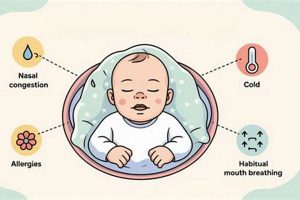
Infant vocalizations during sleep, characterized by periods of distress, are a common occurrence. These episodes range in intensity and duration and can be unsettling for caregivers. They are often spontaneous and seemingly... Read more »

Infant nocturnal vocalizations, often characterized by whimpering, sobbing, or full-fledged cries, are a common experience for parents. These sounds, occurring during periods of sleep, can be unsettling, prompting concern about the well-being... Read more »

Infant nocturnal oral respiration, characterized by the visible gape of the mouth during sleep, is a common observation. This behavior can arise from a variety of factors influencing nasal passage patency and... Read more »

The typical period for a newborn feline’s initial visual perception falls within a specific timeframe after birth. Following delivery, a kitten’s eyelids remain sealed as part of their early development. The physical... Read more »

The timing of an infant’s initial trim is not dictated by a specific age, but rather by individual hair growth and parental preference. Some infants may require a trim within the first... Read more »

Newborns are primarily nasal breathers. This means they instinctively prefer to inhale and exhale through their noses. Oral respiration, or breathing through the mouth, is a secondary mechanism that develops over time.... Read more »

The seemingly unusual posture of infants assuming a knees-chest position during sleep is a common observation. This involves the child resting on their knees with their torso and head lowered towards the... Read more »

The phrase alludes to the proportion of genetic material that offspring inherit from each biological parent. Human offspring receive approximately 50% of their genetic makeup from their mother and 50% from their... Read more »

Infant vocalizations during sleep cycles are a common phenomenon, often causing concern for caregivers. These nocturnal expressions can range from soft whimpers to full-fledged cries, presenting a puzzle regarding their underlying causes.... Read more »

The inquiry centers on whether eagles exhibit cannibalistic behavior toward their offspring, specifically if the eaglets are deceased. This subject addresses a complex intersection of survival strategies, parental behavior, and nutritional needs... Read more »


